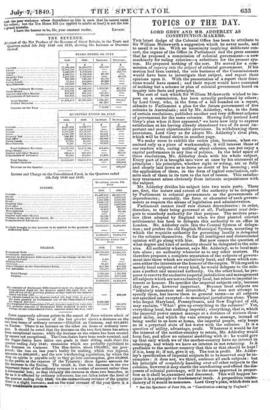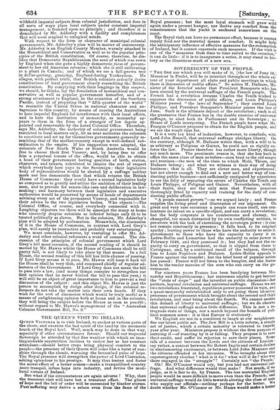TOPICS OF THE DAY.
LORD GREY AND MR. ADDERLEY AS CONSTITUTION-MAKERS.
THE latest dodge of the Colonial Office has been to attribute to Sir William Molesworth a suggestion which he never made, and to assail it as his. With an unanimity implying deliberate con- cert, the organs of the Office in Parliament and the press assume that he proposed a commission of colonial government-a new machinery for ruling colonies-a substitute for the present sys- tem. He proposed nothing of the sort. He moved for a com- mission of inquiry into the suldect of colonial government. If his motion had been carried, the sole business of the Commissioners would have been to investigate that subject, and report their opinions upon it. With the presentation of a report their func- tions would have ceased ; and their report would have consisted of nothing but a scheme or plan of colonial government based on inquiry into facts and principles. The sort of task which Sir William Molesworth wished to im- pose on a commission, has been actually performed by others ; by Lord Grey, who, in the form of a bill founded on a, report, submits to Parliament a plan for the future government of five colonies in Australasia ; and by Mr. Adderley, who, in the form of certain resolutions, publishes another and very different scheme of government for the same colonies. Having fully noticed Lord Grey's plan when it first appeared,* we have now only to express satisfaction at his having already abandoned two of its most im- porMnt and most objectionable provisions. 'In withdrawing these provisions, Lord Grey so far adopts Mr. Adderley's rival plan, which will be found entire in another page. We make room to exhibit the entire plan, because, when ex- amined only as a piece of workmanship, it will interest those of our readers who, caring nothing about colonies, can yet enjoy a capital performance in any line of politics.. In the brief space of these resolutions, Mr. Adderley deals with his whole subject. Every part of it is brought into view at once by his statement of principles : his principles, whether right or wrong,, are so fully and clearly laid down as to leave no doubt of his meaning ; and the application of them, in the form of logical conclusions, sub- mits.each of them in its turn to the test of reason. This satisfac- tory treatment arises obviously from intimate acquaintance with the subject.
Mr. Adderley divides his subject into two main parts. These are, first, the nature and extent of the authority to be delegated by Parliament to colonial governments as the governments of dependencies ; secondly, the form or character of such govern- ments as respects the means of legislation and administration.
Parliament cannot itself rule distant dependencies : in order, therefore, to their being governed at all, Parliament Must dele- gate to somebody authority for that purpose. The modern prac- tice (first adopted by England when we first planted convict settlements) has been to delegate this authority to an office in London. Mr. Adderley calls this the Central System of delega- tion • and prefers the old English Municipal System, according to which the requisite authority for governing locally is delegated to the colonies themselves. So far all intelligent and disinterested opinion will go along with him. But now comes the question of what degree and kind of authority should be delegated to the colo- nies. All authority whatever, says Mr. Adderley, as to local mat- ters alone ; no authority whatever as to any other matters. He therefore proposes a complete separation of the subjects of govern- ment into those which are exclusively local, and those which con- cern either the interests or the honour of the empire. With regard to merely local subjects of every kind, he would delegate to the colo- nies a perfect and unmixed authority. On the other hand, lie pro- poses to reserve for exclusive imperial jurisdiction and management all subjects which are not exclusively local, but relate to imperial in- terests or honour. He specifies the imperial subjects only, because they are few, however important. Because local subjects are "infinitely numerous and diversified," he does not attempt to specify them, but leaves them in general terms-as all subjects not specified and excepted-to municipal jurisdiction alone. Those
who forget Maryland, Pennsylvania, and New England of old, may exclaim, " What ! give up everything to the colonies!" Yes, everything local, but nothing imperial; everything, that is, which the imperial power cannot manage at a distance of sixteen thou- sand miles, and which the vain attempt to manage, instead of being useful to us here at home, the imperial people, only keeps ,us in a perpetual state of hot water with the colonies.' It is a
question of utility, advantage, profit. Whatever it would be for the interest of the mother-country to retain, Mr. Adderley would keep fast, and allow no colonial meddling with it : he would give up that only which we of the mother-country have no interest in retaining, and which we have an interest in not retaining. IS it profitable to the mother-country that this or that should be kept? if it is, keep it; if not give it up. The test is profit. Mr. Adder- ley's specification of imperial subjects fit to be reserved may be in- complete : it does not, we think, embrace all such subjects : but his principle of completely handing over all other subjects to the
colonies, however it may startle the unreflecting and offend the dis- posers of colonial patronage, will be the more approved in propor- tion as it shall be,examined and discussed. This will happen be-
cause it is a principle or fundamental truth. A proposition' cnntra- aWturyof it Amnia be nonsense. Lord Grey's pldn, ithich dna not * See the Spectator of June 9th, on "Constitution-making by England."
withhold imperial subjects from colonial jurisdiction, and does in all sorts of ways place local subjects under constant imperial management, is founded upon no principle ; and therefore it is demolished by Mr. Adderley with a facility and completeness that will seem magical to unlogical minds.
With respect to the form or character of municipal colonial governments, Mr. Adderley's plan will be matter of controversy. Mr. Adderley is an English County Member, warmly attached to the Monarchical and Conservative as well as to the popular prin- ciples of the British constitution. Of course, therefore, he dis- likes that Democratic Republicanism the seed of which was sown by England when she gave a highly democratic form of govern- ment to her old American colonies; which she is still cultivating as a plant in Canada; and of which we see a full-grown tree in dollar-getting, grasping, England-hating Yankeedom. He alleges, with perfect truth, that British colonists ardently desire constitutions of local government closely resembling the British constitution. By complying with their longings in this respect, we should, be thinks, lay the foundation of monarchical and con- servative as well as popular government hereafter, and of a strong attachment to England, in the countries of the Southern Pacific, instead of preparing that " fifth quarter of the world" to resemble the United States in national character and an- tagonism to this country, by means of causing the Australians to hate imperial England for interference with their local affairs, and to bate the institution of monarchy, as monarchy ap- pears to them in the form of a stranger of low degree ap- pointed and removeable by the hated Colonial Office. Therefore, says Mr. Adderley, the authority of colonial government being restricted to local matters only, let us next authorize the colonists to constitute and set up for themselves governments generally re- sembling that of the mother-country except in well-defined sub- ordination to the empire. If his suggestion were adopted, the colonists of New South Wales or South Australia would be free to choose their first Viceroy, and, by being free to offer him a perpetual tenure of the office, would be able to obtain a head of their government having qualities of birth, station, character, and talents, calculated to inspire the sort of respect which everybody here pays to the Sovereign : their legislative body of representatives would be elected by a suffrage neither more nor less democratic than that which returns the British douse of Commons: they would have a second legislative body HO composed as to gratify and utilize the ambition of their leading men, and to provide for senate-like care and deliberation in law- making : and harmony between their legislative and executive authorities would be preserved by means of beads of departments advising every act of the permanent Viceroy, and responsible for their advice to the two legislative bodies. Who objects ?—The Colonial Office, of course, and everybody connected with it. Laughing objectors too there will be amongst the many at home who sincerely despise colonists as inferior beings only fit to be treated politically as slaves. But in the colonies, Mr. Adderley's plan will be adopted by acclamation. Meanwhile, the discussion of it in the House of Commons, in contrast with Lord Grey's plan, will surely be instructive and probably very entertaining. We must conclude, however, by venturing to offer Mr. Ad- derley and other colonial reformers a word of counsel. The dis- cussion of the principles of colonial government which Lord Grey's bill must occasion, if the second reading of it should be moved by Mr. Hawes whilst the House of Commons shall be still pretty full, is not likely to take place by that means. In a full House, the second reading of this bill has little chance of passing. If Lord Grey means it to pass, Mr. Hawes will keep it back till the House shall be very thin, and composed chiefly of regular ad- herents of the Government. If Lord Grey does not mean the bill to pass into a law, (and many things conspire to strengthen our first opinion that he never wished the bill to pass this year,) it will still be an object of great importance to him to prevent a real discussion of the subject : and this object Mr. Hawes is just the person to accomplish by dodge after dodge, if the colonial re- formers do not take the matter into their own hands. If they wish for the sort of discussion which would be truly useful as a means of enlightening opinion both at home and in the colonies, they will bring the subject before the House as soon as possible, without regard to Mr. Hawea's management of the "Australian Colonies Government Bill, No. 2."

























 Previous page
Previous page